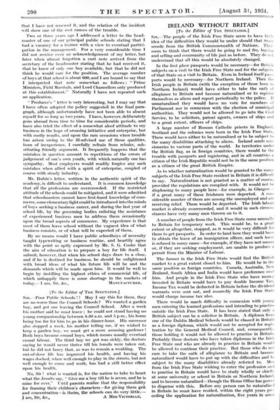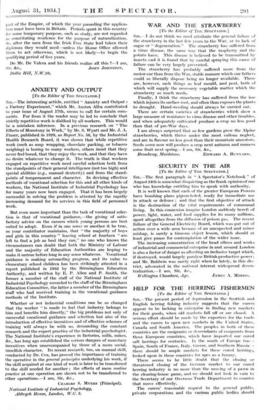IRELAND WITHOUT BRITAIN
[To the Editor of THE SPECTATOR.]
SIR,--The people of the Irish Free State seem to have little idea of the difficulties they would be under should that State secede from the British Commonwealth of Nations. They seem to think that there would be going to and fro, buying and selling and community of life just as before. They do wit understand that all this would be absolutely changed.
In the first place passports would be necessary—for British subjects on a visit to the Irish Free State and for the subjects of that State on a visit to Britain. Even in Ireland itself pass- ports would be necessary—for Northern Ireland. Then the Irish people in Britain (with the exception of those born in Northern Ireland) would have either to take the oath of allegiance to Britain and become naturalized or to register themselves as aliens and report periodically to the police. if unnaturalized they would have no vote for members of Parliament nor in connexion with the election of municipal authorities. They would not be allowed to go into the Civil Service, to be solicitors, patent agents, owners of ships and to a great extent, officers of ships.
A large number of Roman Catholic priests in England, Scotland and the colonies were born in the Irish Free State. These would have either to be naturalized or to be subject to the many disabilities attaching to aliens. Ireland sends mis- sionaries to various parts of the world. In territories under the British flag, as in foreign countries, there would be the trouble with passports and registering, and in all countries a citizen of the Irish Republic would not be in the same position as a citizen of the great British Empire.
As to whether naturalization would be granted to the many subjects of the Irish Free State resident in Britain it is difficult to say. Naturalization is not granted as a matter of course, provided the regulations are complied with. It would not be displeasing to many. people here—for example, in Glasgow— if a great many of these Irishmen were deported. A con- siderable number of them are among the unemployed and are receiving relief. These would be deported. The Irish labour market is already overcrowded, and it would in such circum- stances have very many men thrown on to it.
A number of people from the Irish Free State come annually to Britain for temporary work. This would be, to a great extent or altogether, stopped, as it would be very difficult for them to get passports. In order to land here they would have to obtain the leave of an immigration officer, and such leave is refused in many cases—for example, if they have not means or, if they are seeking employment, are unable to produce a permit from the Minister of Labour.
The farmer in the Irish Free State would find the British market to a great extent closed to him. He would be in the same position as foreign countries. Canada, Australia, New Zealand, South Africa and India would have preference over him. And people in the Irish Free State who have money invested in Britain would have to pay double Income Tax. Income Tax would be deducted in Britain before the dividend warrants were sent out, and assuredly the Irish Free State would charge income tax also.
There would be much difficulty in connexion with young men entering the learned professions and intending to practise outside the Irish Free State. It has been stated that only a British subject can be a solicitor in Britain. A diploma from one of the Dublin Medical Schools would be classed in Britain as a foreign diploma, which would not be accepted for regis- tration by the General Medical Council, and, consequently. those holding it would not be allowed to practise in Britain. Probably- those doctors who have taken diplomas in the Irish Free State and who are already in practice in Britain would be allowed to continue their practice. But those who do not care to take the oath of allegiance to Britain and become naturalized would have to put up with the difficulties and he subject to the many disabilities already referred to. Men from the Irish Free State wishing to enter the profession and to practise in Britain would have to study wholly or chiefly at some university or school in Britain or Northern Ireland, and to become naturalized—though the Home Office has power to dispense with this. Before any person can be naturalized in Britain he muit have resided, within the eight years pre- ceding the application for naturalization, five years in some
part of the Empire, of which the year preceding the applica- tion must have been in Britain. Periods spent in this country for sonic temporary purpose, such as study, are not regarded as constituting residence for the purpose of naturalization. So, after the men from the Irish Free State had taken their diplomas they would need—unless the Home Office allowed them to act otherwise, which is not likely—to begin the qualifying period of five years.
Do Mr. De Valera and his friends realize all this ?—I am,







































 Previous page
Previous page